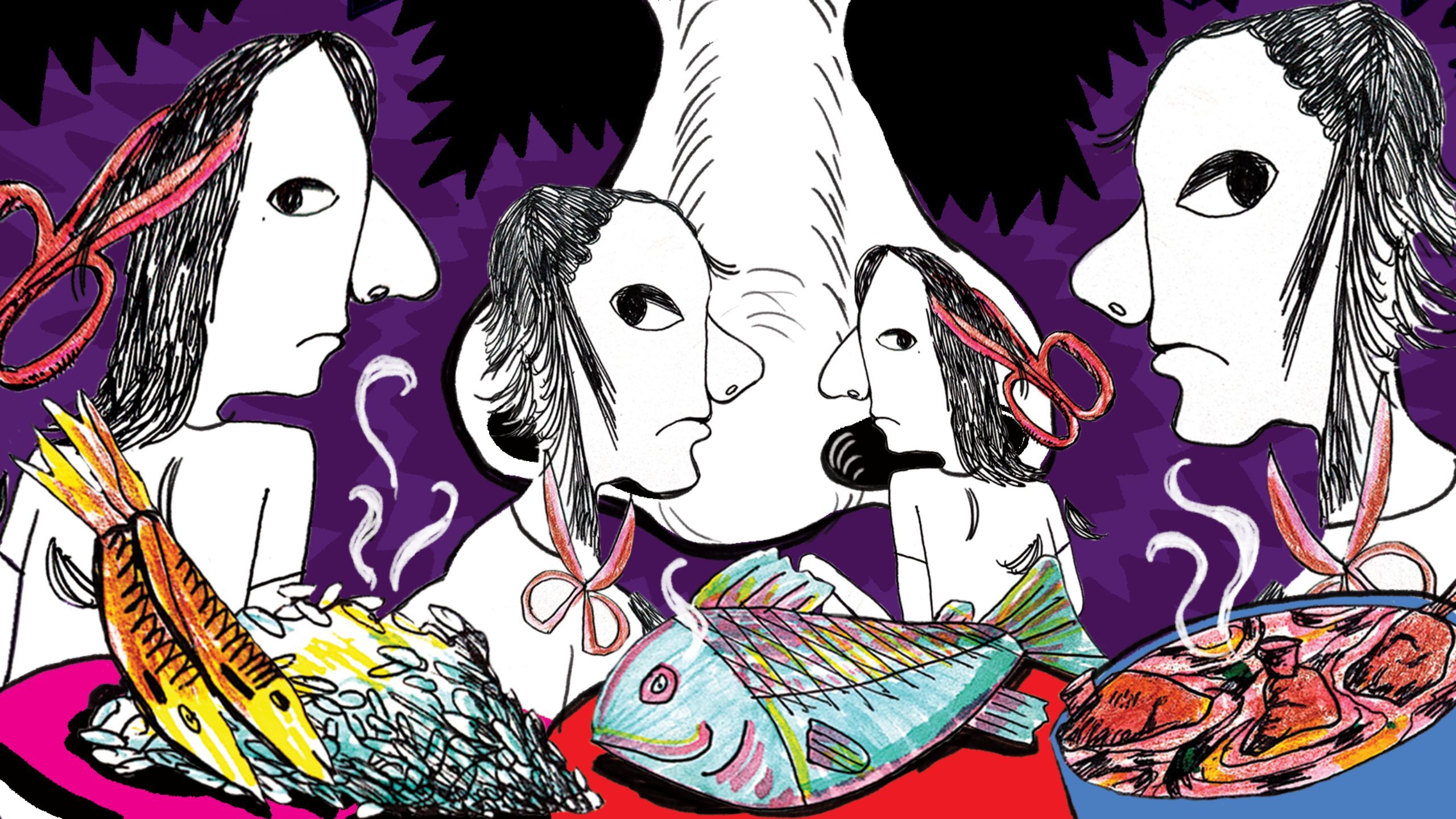How Caste Smells: Notes From A South Asian Beauty Salon In London
In a London beauty salon run by women from the subcontinent, links between caste, food and odour echo the arguments in the debate in India over a ‘pure vegetarian’ delivery fleet

Those of you who go to beauty salons, what do you expect them to smell like? Fragrant with essential oils and candles diffusing aromas of pine, tea tree or lavender? Hygienic and redolent of disinfectants and sanitisers that make you feel safe? Or just the fruity and floral with scents of shampoos, creams and other beauty products mixing together?
Whatever your olfactory expectations, you certainly do not expect it to emit the messy and mundane odours of everyday life, the smells that you wish to escape from by going to a beauty salon in the first place. We learn how certain smells belong in certain spaces. The smell of spices is welcome in the kitchen but might seem misplaced in a beauty salon that one associates with leisure and luxury.
The way we engage with the smells of a space are shaped by our socio-cultural contexts. Although it may appear so, our sensory perception is by no means neutral or universal. It is produced historically and culturally, and in turn, does the work of inscribing caste and class onto the spaces we inhabit and move through. This was driven home to me by the time I spent in Anita’s Hair & Beauty, a small salon situated in London where I conducted part of my doctoral research.
I spent 6-8 hours, one day a week for nearly two years, observing, taking notes and talking to the beauticians and customers at Anita’s Hair & Beauty. Having migrated to the UK from Nepal, Anita* opened her salon in 2018. Depending on how busy the salon was at that time of the year, she employed 2-4 beauticians working full or part time with her. During my fieldwork, these beauticians were first-generation migrant women from Gujarat, Goa and Daman & Diu in India.
At Anita’s salon, lunch was never a dull affair. Even if several customers were waiting their turn, Anita would send the beauticians on a lunch break as soon as the clock struck 1pm. The beauticians spread out a buffet of home-cooked food on the table used for facials and massages. The smell of chicken, fish and vegetable curries diffused into the salon, mixing with the fragrance of shampoos and face creams. As there was no proper ventilation, these smells hung in the air all afternoon. While the smells of food were noticeable, even mildly discomfiting to me, an upper-caste and middle-class researcher, they were not deemed unprofessional or bothersome by the salon owner or the beauticians, which led me to reflect on the relationship between caste, class and smells.
Incense And Spice
The Indian food delivery app, Zomato, recently courted controversy by introducing a special delivery service of ‘pure vegetarian’ food to customers who are particular that their food is not rendered ‘impure’ through any kind of contact with ‘non-veg’ food. This food was to be delivered by a dedicated fleet of delivery workers in green uniform, a measure that was rolled back after this scheme was called out as casteist.
Similar, entrenched ideas about caste, odour and food played out everyday at Anita’s parlour.
In a distinctly Hindu-Gujarati neighbourhood of London, Anita’s Hair & Beauty shared the street with a large Hindu temple and was flanked by shops selling idols of Hindu deities and Indian clothing for women. A totem of a lemon and seven green chillies tied together, meant to ward off the evil eye of competitors, hung by a thread at the entrance of the small and cramped salon. It consisted of a low-ceilinged room with three salon chairs and four small decorative mirrors glued to the wall and embellished with plastic roses from Ikea.
A light blue wallpaper stuck on haphazardly created crooked lines on the walls. Not receiving any natural light, the room was lit up by eight fluorescent tube lights attached to the ceiling. The wash basin was placed right next to the entrance of the salon. Near the entrance, there were two benches for customers to wait on, doubling up as storage units for salon products.
The salon did not have a separate reception area or a private cubicle for massages. One corner of the room was partitioned off with curtains where a customer could lie down on a massage bed for a private treatment such as massage, facial or body hair waxing. There was also a small annexe to the room partitioned off with a curtain with another massage bed, a microwave and a tiny refrigerator – this is where the beauticians ate lunch.
A small altar with tiny figurines of Hindu deities such as Ram, Sita and Ganesh was fixed to the corner of a wall. After opening the salon at about 10 am, Anita lit a lamp at the altar. She also burnt incense sticks in a purification ritual ensuring that the smoke reached every corner of the salon. Then she played devotional songs on her phone for the first hour before turning on the radio. Suffused with the sounds of devotional music and the smoke of incense sticks, the salon felt like a sacred Hindu space during this hour.
Soon, the incense was overshadowed by the smell of chicken, mutton or dried fish that the beauticians, including Anita, brought from their homes and heated up in the microwave. They ate in the presence of customers, separated by a thin curtain, without any concern for hiding the strong smells of spicy food. In retail and service industries, customers rarely get to witness the private lives of workers. This includes when and where workers have their meals. While most service industry workers eat hidden from the view of customers, they are also not supposed to leave smelly traces of their private lives that may disrupt the sanitized smellscape of the impersonal workplace. Therefore, consuming food with strong smells is considered unprofessional, even unhygienic, in high-end hair and beauty salons.
Smelling caste, caste-ing smell
Anita’s salon, however, was patronised mainly by working-class women from India, Nepal and Sri Lanka due to its affordable pricing. For example, when I started fieldwork there in 2021, eyebrow threading cost £2.50 (around Rs 260), half of what you paid at other salons. Probably because the beauticians hailed from similar class and migratory backgrounds as their customers, they did not subscribe to the classed rules of the service industry on how to treat customers in order to make them feel pampered.
They had a matter-of-fact attitude towards food: workers needed to eat and since what they ate was home-cooked food with aromatics such as ginger, garlic and masala, and very often meat and fish, it was going to emit a distinctive smell. Not only beauticians, but customers who stopped by before their factory shift or in-between their multiple low-paid jobs also felt free to eat their packed lunches in the salon. As the salon did not have windows or a ventilation system, the odour of food was just one of the odours of everyday life that lingered in the air.
During the early days of my fieldwork, a Gujarati mother and daughter came to Anita’s Hair & Beauty. While the mother got her hair dyed, the daughter chatted with me about the beauty products she used and how important it was to her that they be vegan and not tested on animals. Her mother was taken to the wash basin to wash the dye off her hair. At an arm’s length from her, on the other side of a closed curtain, salon owner Anita warmed up her lunch in the microwave. The woman let out a performative cough indicating that she was perturbed by the smell of food.
Beautician Rekha* who was washing the woman’s hair said to Anita in jest: ‘Hey, what are you eating? We can smell it here.’ ‘She is having a milkshake,’ she turned to the coughing woman, in a feeble attempt to placate her. Her eyes watering, the woman was coughing incessantly by then. ‘Khabar che (I know). I know what she is eating,’ she remarked sardonically. The whole incident did not make much sense to me until Anita stepped out from behind the curtain to say, ‘Auntie, I wasn’t having meat, it was only vegetable soup.’
The woman’s reaction to the perceived smell of meat makes it clear that vegetarianism is not merely a dietary preference in South Asia but a proclamation of caste-based purity. I later learnt that it was common for upper-caste vegetarian Gujaratis, mainly belonging to the Swaminarayan sect, to act out their disgust and repulsion at the smell of meat wafting in from the annexe where the beauticians had lunch. They voiced their disapproval of meat consumption aloud. Pointing out this exaggerated performance of disgust, Ritu*, a beautician at the salon who came from a family of fisher-folks in Gujarat, pointed out: ‘They react excessively here, even more than they do in India. And then they go to the GP complaining of deficiencies and get prescribed pills with fish oil. Toh? Isn’t it the same?’
Moral Superiority vs Professional Hierarchy
A beautician who came from a marginalised fishing community in Daman regularly brought dried fish for lunch. As a meat-and-fish-eating Bengali upper caste researcher, even though I loved the taste of the spicy fish prepared with onions and red chilli that she used to share with me, I flinched at its smell when she heated it up in the microwave. She was so habituated to it that she barely registered the strong and overpowering smell. Vegetarian, upper-caste customers, on the other hand, took it as a personal affront, as they associated the smell with moral impurity that was out to pollute them against their will. To counter this involuntary pollution, they tried to exercise control over a space that they moved through temporarily by asking the beauticians not to consume ‘non-veg’ in the salon.
It was ironic that even the owner of the salon, Anita, was unable to escape these kinds of attempts to regulate the space that belonged to her. This was, however, not incidental. Anita belonged to a caste that was, by her own admission, low in the caste hierarchy in Nepal. The packed lunch that Anita brought from home consisted of chicken or fish or, occasionally, lamb. Although she was careful to close the curtain when she ate in the annexe, preventing customers from seeing her food, it was hard not to notice the smell pervading the small and cramped salon. This often put the salon owner in a position of conflict with the vegetarian Gujaratis who formed a large part of her clientele.
Customers came and went, but the conflict peaked when a fellow beautician disapproved of Anita’s food practices. Sonali*, who worked in the salon three days a week, was a vegetarian Gujarati and expressed her discontent at lunchtime without fail. This also goes on to show that belief in one’s own practice or habit as superior is powerful enough to manifest even in an employee-employer relationship, posing a challenge to the traditional notion of hierarchy.
One day while I was at the salon, Anita invited me to share lunch with her — bread and fish curry. She already knew that Sonali would complain about the smell once we started eating and, sure enough, Sonali frowned. ‘Please don’t eat “non-veg” here at the salon,’ she pleaded. ‘Okay darling, then you bring lunch for me,’ said Anita, making light of the matter. ‘I will bring lunch for you but I come here only three days a week,’ Sonali said. ‘Okay, rest of the days I will eat meat,’ said Anita. ‘No, you won’t eat meat even on those days. It is not good to eat meat in the salon in front of customers. Everyone can smell it,’ said Sonali. ‘Okay darling, I will do as you say. I know you don’t like the smell of non-veg food,’ Anita conceded.
Thus, even though Sonali was an employee at Anita’s salon, she exercised moral superiority over Anita by condemning food habits that she saw as inferior and ‘unprofessional’. On another occasion, Sonali frowned upon a Muslim customer bringing raw eggs to the salon to mix with her henna in order to condition her hair. When Anita joked that Sonali had to learn how to break eggs as part of beauty work, Sonali scrunched her nose and moved away from the area where Anita was whisking the eggs into the henna powder. In this case, it was much less about ‘professionalism’ and more about the presence of objects and smells in the salon that Sonali found repugnant.
Caste Never Invoked Directly
As is often the case in South Asia, the talk about smells in Anita’s salon was couched in a language of vegetarianism versus ‘non-vegetarianism’ and professional versus unprofessional behaviour. Caste was rarely ever invoked directly, except by Anita, who loved to tell the story of how she had eloped with her husband, then boyfriend, as she belonged to a lower caste and his family would not have accepted her. It was presented as a fact about Nepal, about how prevalent the caste system was in her country. Indian beauticians acted surprised, relegating caste to ancient history in their country, refusing to see how caste organised their own lives. This was even more surprising given that beauty work still remains a caste-based profession for the most part.
In my conversations with beauty salon owners in India and in the UK, I found that many of them belonged to the occupational caste of barbers, classified as a ‘backward’ caste in India. As men of this caste are barbers, it is seen as a natural progression for the women to work as beauticians. Beauticians also failed to see how the principle of purity and pollution underpinning the caste system manifested itself when a Gujarati woman refused to be touched by a beautician who volunteered the information that she was on her period. In this case, the customer could maintain caste purity by averting a polluting touch. Smells, on the other hand, did not ask for permission. They permeated the environment and their lungs, providing a litmus taste for the tenacity of caste.
In South Asia, smells have historically been the markers of caste. Caste not only determines which smells get classified as odours but also who can control and manipulate those odours. While a savarna, middle-class IT professional can leave behind everyday odours, spray on a perfume and go to their sanitised workplace which is cleaned by others, a Dalit sanitation worker cleaning sewers must live with work-related malodour even when not working.
In her work on caste and smells in leather tanneries, Shivani Kapoor describes how leather tannery workers take a quick bath in factory outhouses before going home so that stray dogs wouldn’t follow the smell of rotting flesh and blood on their bodies, giving away their caste. While the rich spray their toilets with deodorisers after defecating, the poor and the marginalised are forced to live next to garbage dumps and public toilets bearing malodour as a form of political violence. The smells we must live with, the smells we register and the smells that we get used to, reek of our caste and class position.
At Anita’s salon, I was curious to see if Sonali would indeed start bringing lunch for Anita and if Anita would stop consuming meat and fish. What I found instead was that in a couple of weeks after that incident, Sonali had quit. Although the official reason given by her was that she was offered a position at the beauty salon where she worked before having a baby, I wondered to what degree her decision was influenced by the smells of meat and eggs in the salon.
Suggested reading
Guru, Gopal, and Sundar Sarrukai (2012). The Cracked Mirror: An Indian Debate on Experience and Theory. New Delhi: Oxford University Press.
Shivani Kapoor (2021). The violence of odors: sensory politics of caste in a leather tannery. The Senses and Society, 16:2, 164-176.
Joel Lee (2017). Odor and Order: How Caste Is Inscribed in Space and Sensoria. Comparative Studies of South Asia, Africa and the Middle East, 37:3, 470-490.
*All names, including that of the salon, have been changed to protect identities.
We believe everyone deserves equal access to accurate news. Support from our readers enables us to keep our journalism open and free for everyone, all over the world.




